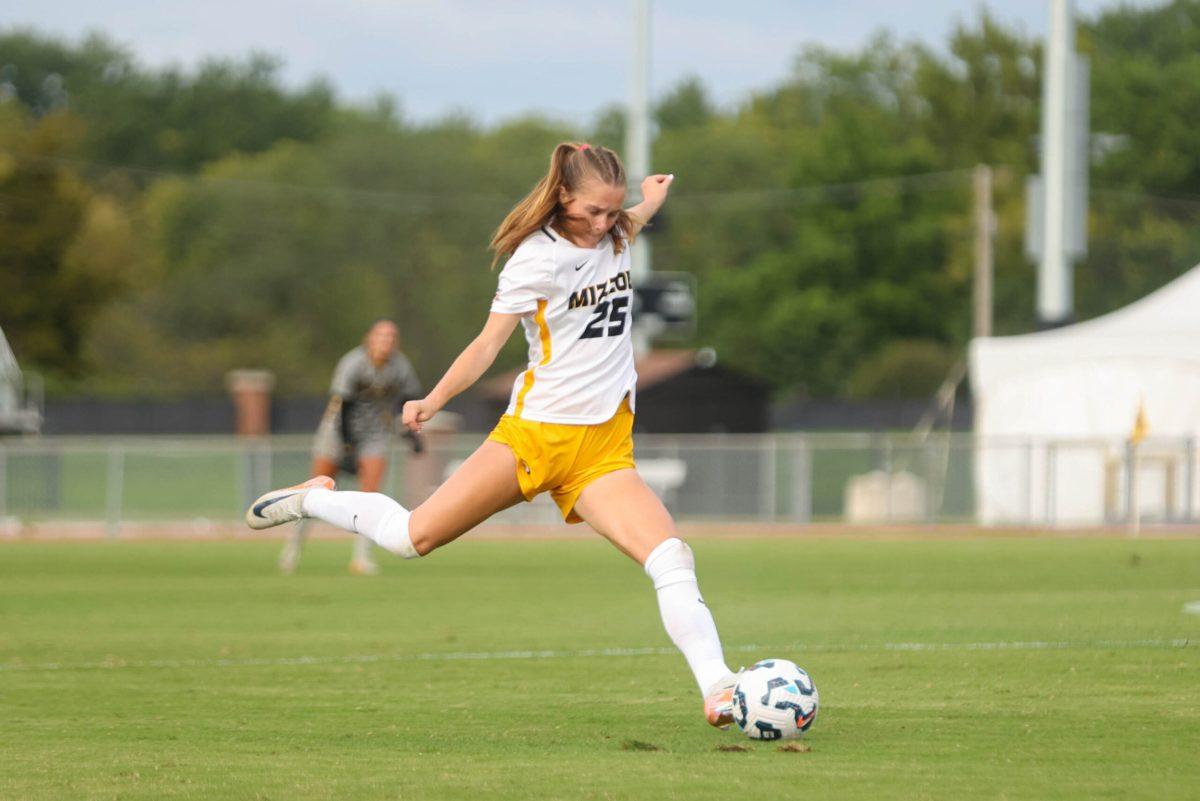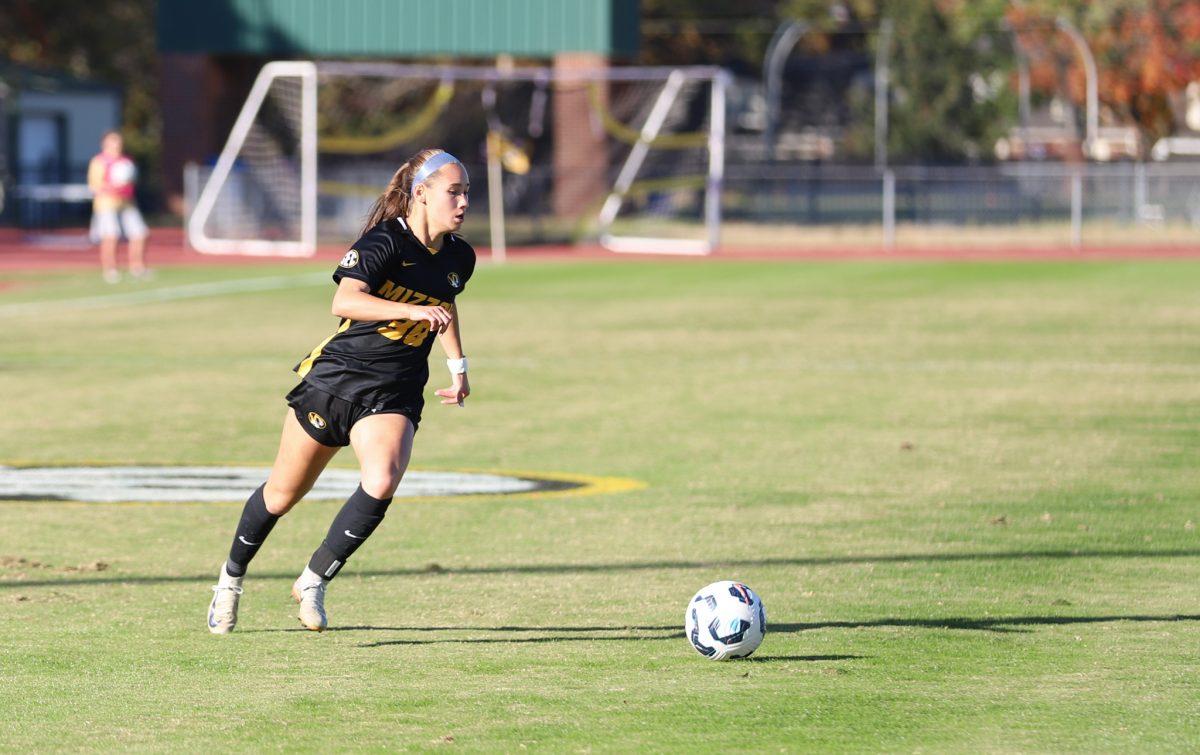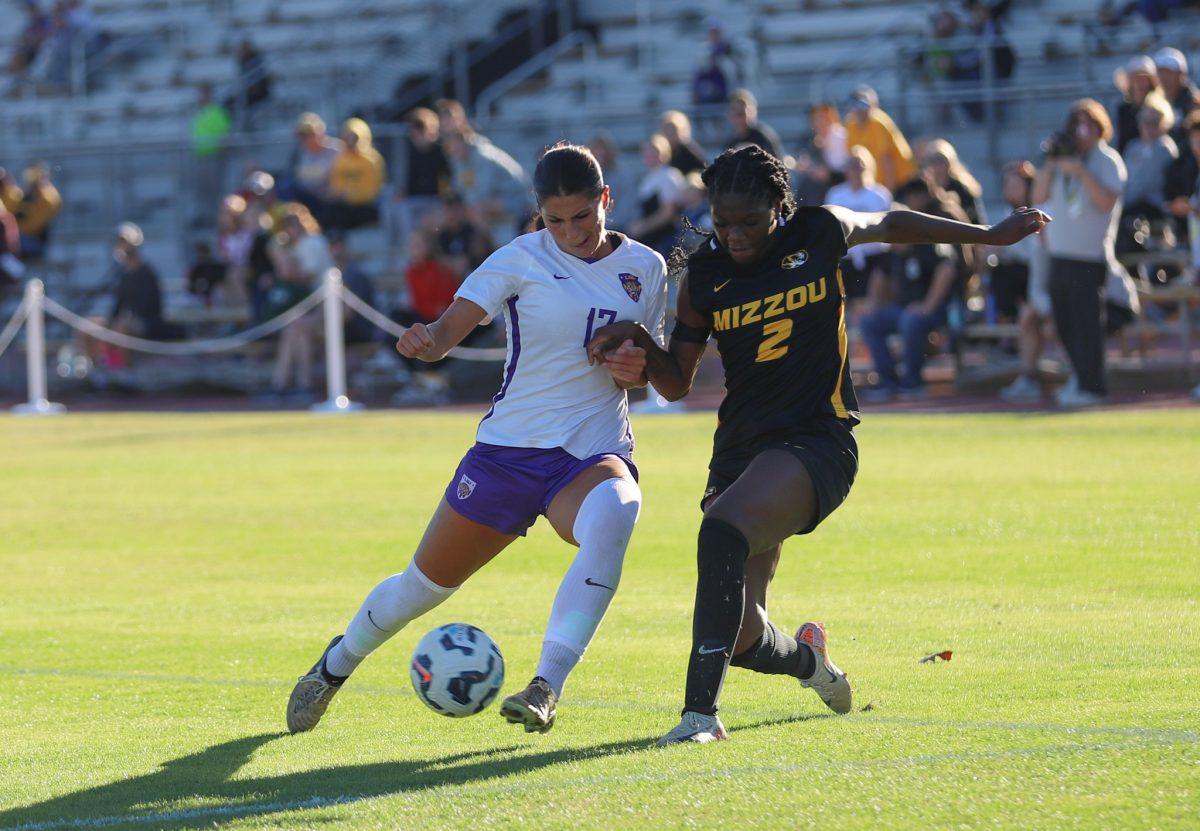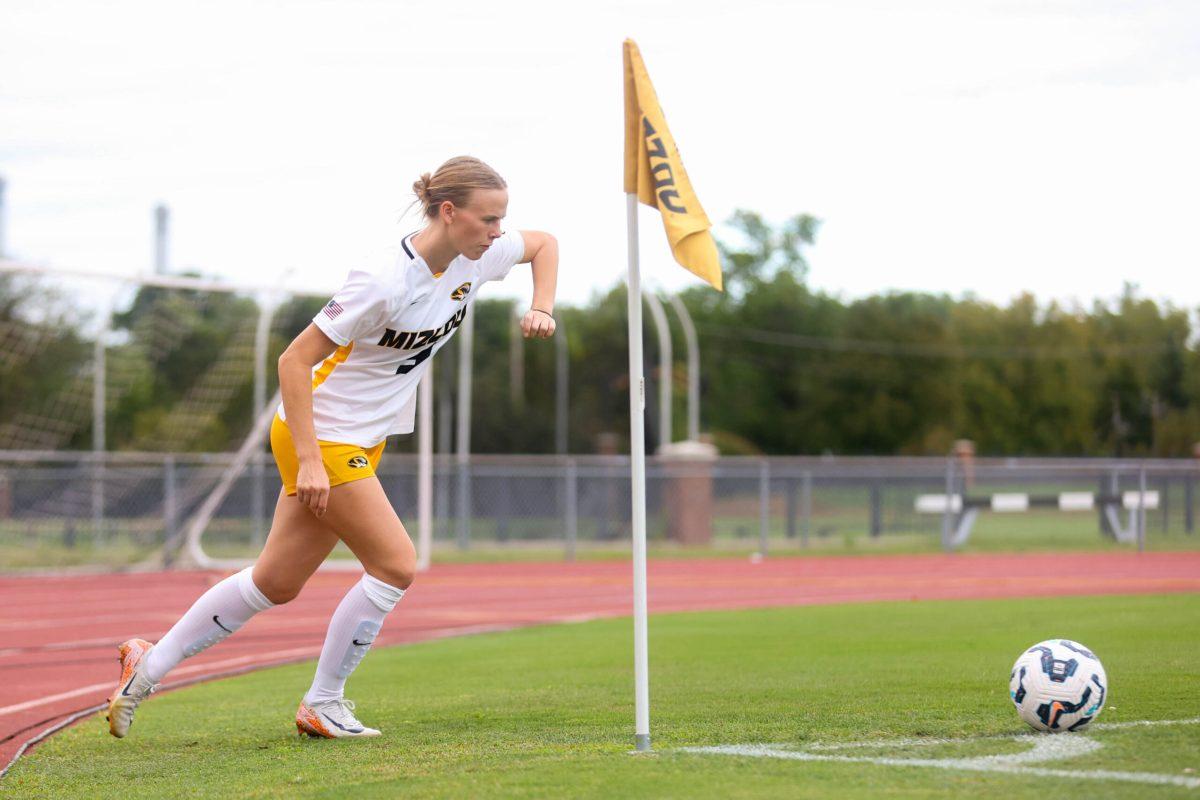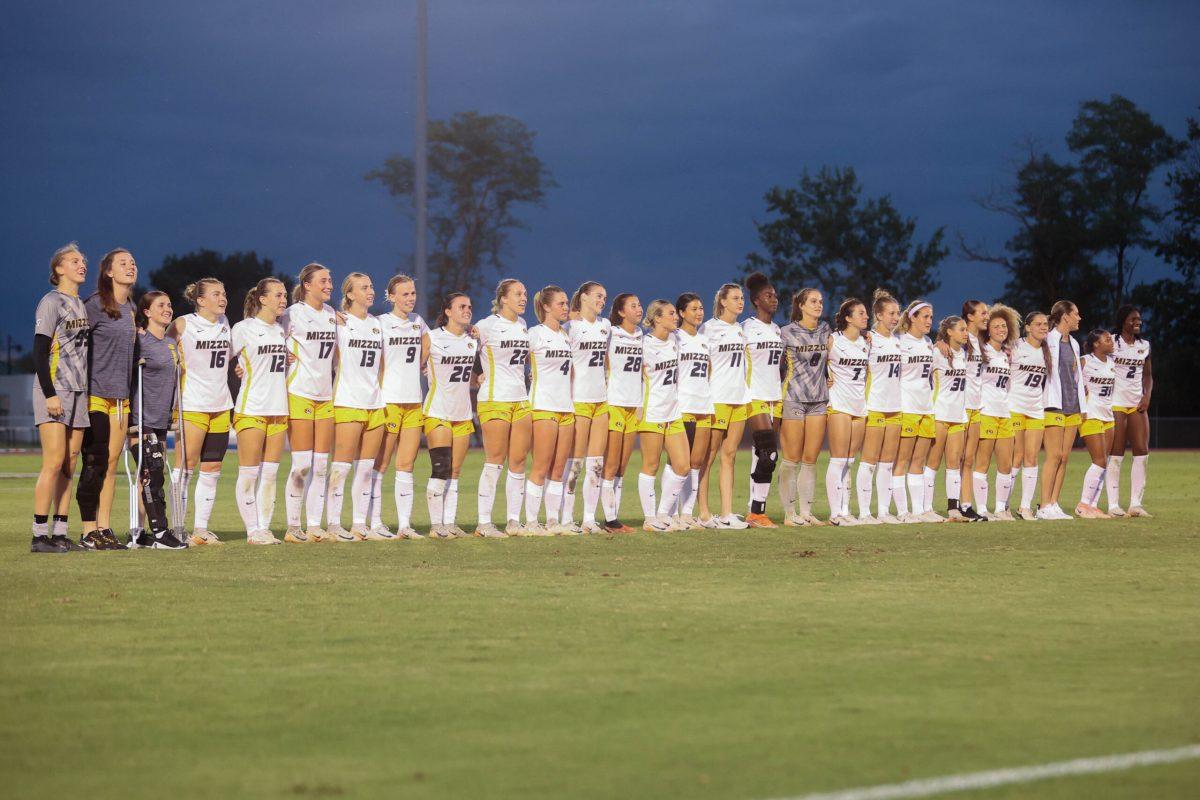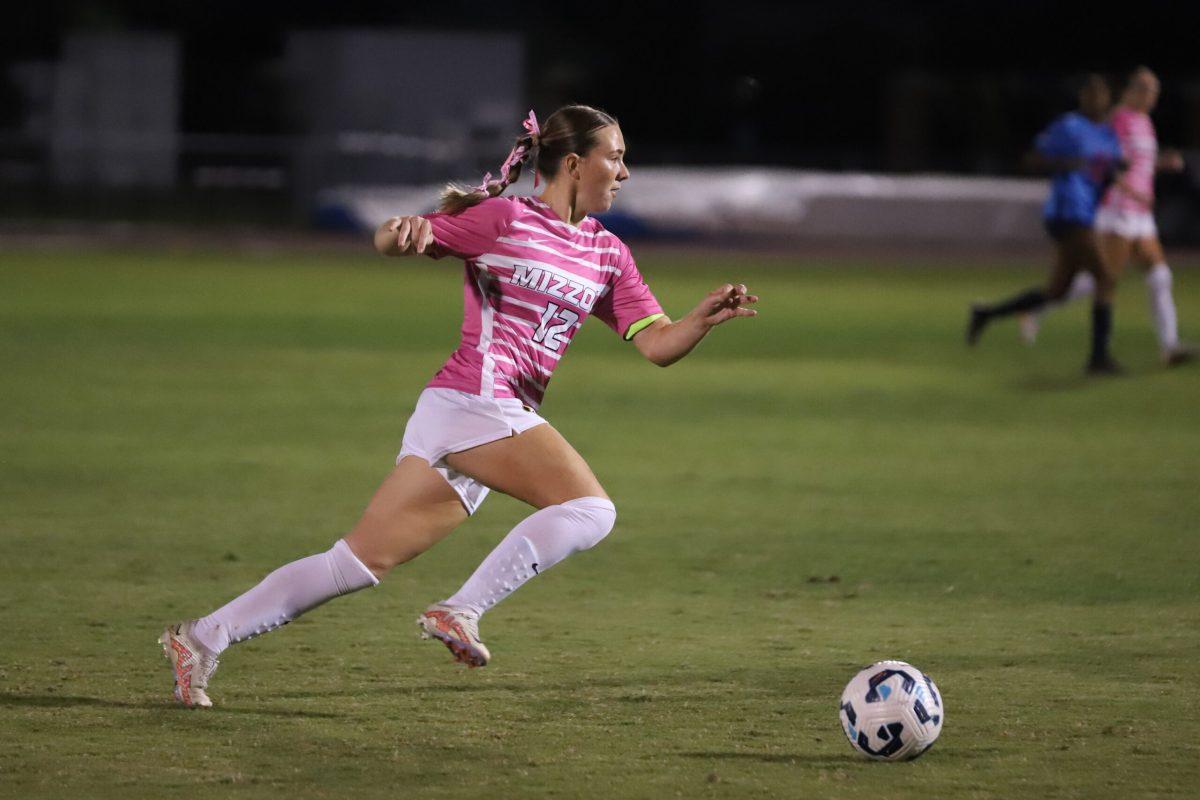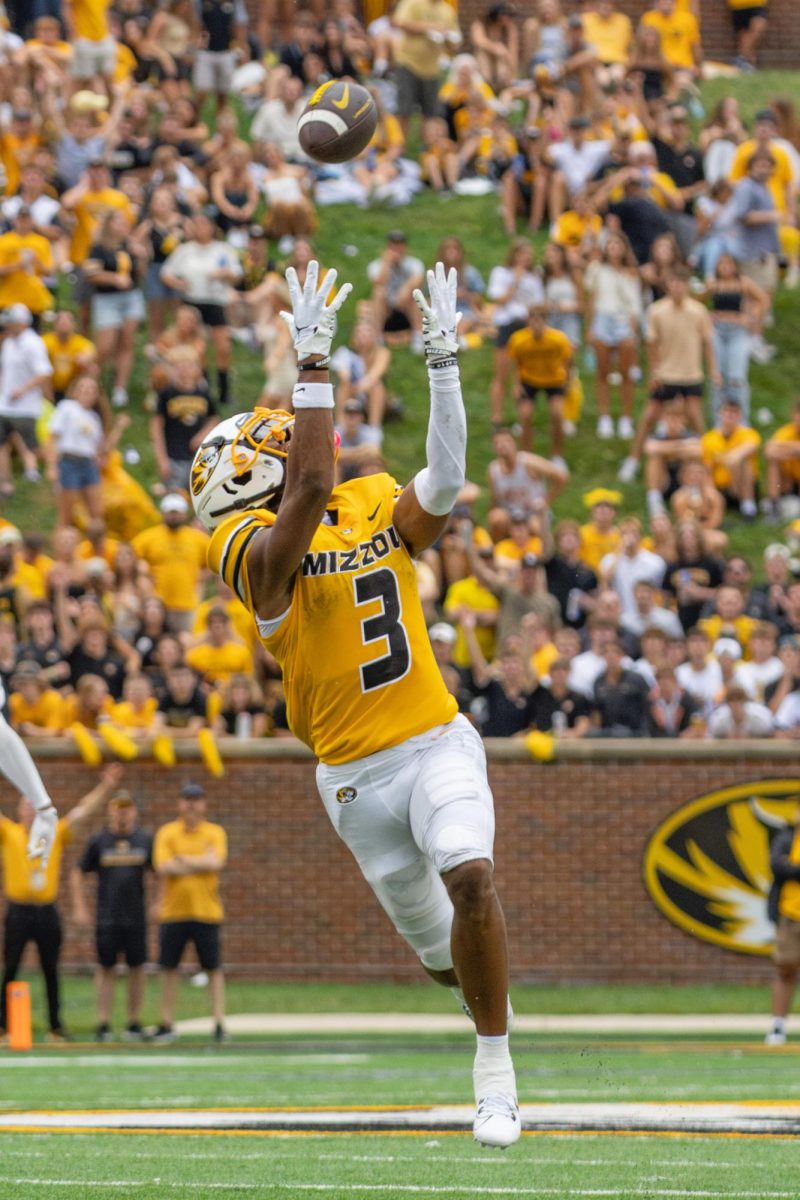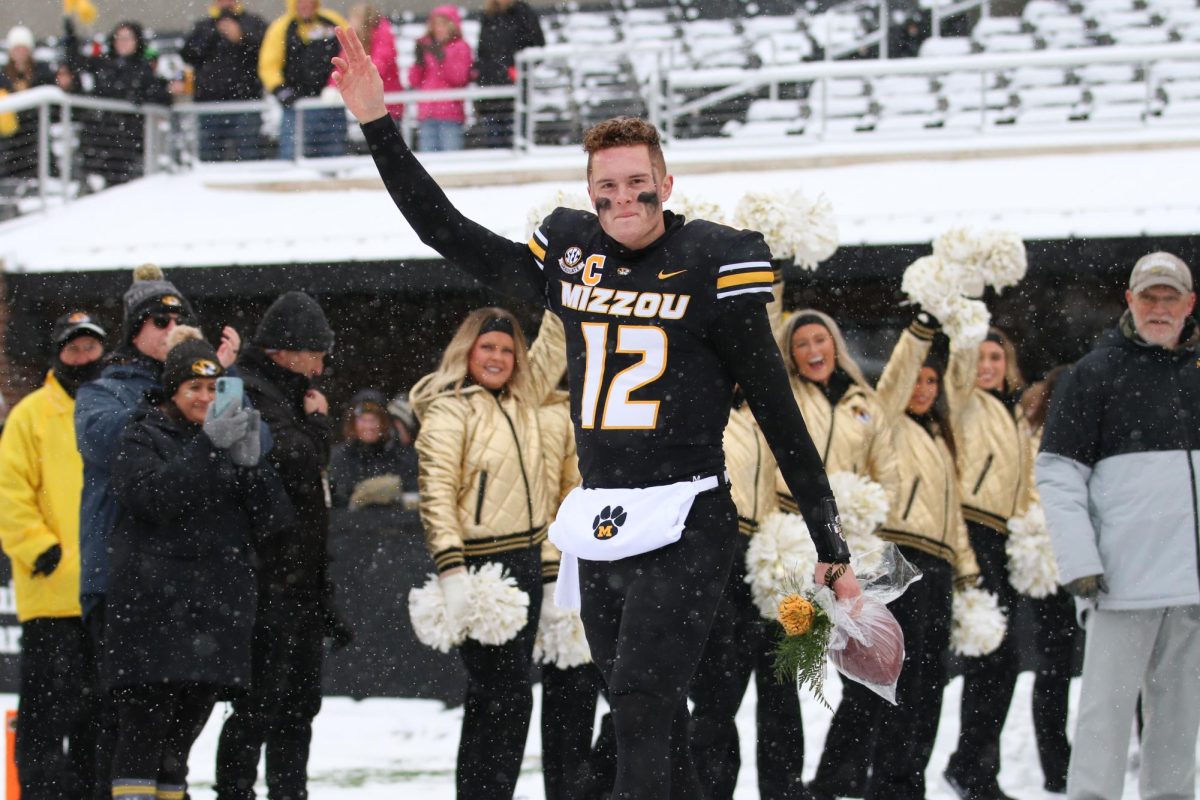The world went dark after lunch.
That’s how Peyton Bauman found out she needed help.
As she left the athletes’ dining hall one afternoon, Bauman, the starting goalkeeper for the University of Missouri women’s soccer team, lost feeling in her hands and legs. Soon after, her vision and hearing went too.
She fell, and a passing football player drove her to the hospital. She spent four days there as doctors worked to find out what happened.
Her teammates left for Nashville to play a game against Vanderbilt. Peyton stayed back, alone in her apartment.
Her mom, Michelle Bauman, remembers talking to her that night and feeling uneasy. Peyton was getting sicker and sicker. Michelle ordered groceries to be delivered to her daughter.
“I called her to let her know the groceries had gotten there and I called later and she wasn’t making any sense. Then I called her later and couldn’t get a hold of her and that’s when I called the trainer and said ‘Somebody needs to get there,’” Michelle remembers.
An ambulance met the athletic trainers at Peyton’s apartment, where paramedics would find her on the floor, confused and scared.
Seizures have that kind of effect on people.
During the ensuing stretch of medical tests and visits to the doctor, Peyton returned home to Dallas. There, she received a diagnosis: viral meningitis.
It was, after a challenging four-year stretch for Peyton, just the tip of the iceberg. For her future as a soccer player, it was a tip of her cap farewell.
In January of 2020, a phone call from coach Bryan Blitz closed the curtains on Peyton’s career.
Missouri had decided to medically retire her. That was that.
***
Born in St. Louis, Peyton Bauman began playing soccer at three years old.
After moving to Dallas at age five, Peyton’s family got her involved in the Texas soccer scene as soon as possible — and for good reason.
To Peyton, soccer was everything.
In fourth grade Peyton joined Solar Soccer Club, a competitive program whose motto — “Soccer excellence through development” — struck a chord with an ambitious Peyton.
The club lived up to the catchphrase. Peyton’s team, Solar Chelsea ECNL, won three Texas conference titles and two Texas State Cup championships before she left for college.
As it sometimes goes for successful athletes, Peyton’s ability and competitive nature were in her genes. Both her parents, Kevin and Michelle, played competitive sports growing up.
Peyton’s plan was always to play at a better and better level. She transferred to Marcus (Flower Mound, Texas) High School ahead of her sophomore year, a program that was ranked No. 12 in the nation before Peyton graduated.
Even then, something had to come next. College visits began in seventh grade.
“That was always the plan for everybody on my club team,” Peyton says. “You know, you’re gonna go to college wherever you want and you’ll play college soccer.”
In her high school years, Peyton’s commitment and dedication to the sport she loved was evident. Her willingness to miss out on certain aspects of the “typical” high school experience surprised and impressed her friends and family.
Peyton impressed and surprised friends and family with her dedication throughout high school. The cliches of the high school experience fell away in pursuit of collegiate soccer.
“Most of the time she couldn’t hang out because she was trying to get better at soccer and she had individual workouts and training and stuff like that,” says Tatum Barber, Peyton’s childhood best friend and a senior on Georgia Southern’s women’s basketball team. “Us both being athletes, we would support each other a lot but also understood that because of that we were always super busy. She’s the hardest worker I know.”
In just her sophomore year, Peyton verbally committed to Missouri as a goalkeeper.
Ready to hit the ground running, she graduated high school early to move to Columbia in the spring of 2017.
But to her dismay, Peyton was asked to redshirt shortly after the end of spring training, meaning she would sit out the season to save a year of eligibility.
With four goalkeepers in front of her on the depth chart, Peyton was left in a spot she wasn’t used to: She wasn’t the best on the team, or even at her own position.
“It took me a while to get it in my head that I wasn’t the shit anymore,” Peyton says.
Looking back, the plan was probably for her to redshirt all along, a common practice among bigger college programs.
It wasn’t the end of the world. Peyton would still practice with the team and retain her scholarship, she just couldn’t travel with the team, or, of course, play in games. And after all, redshirting meant an extra year of eligibility and regular playing time down the road.
Peyton was playing the long game. The future looked bright.
***
Peyton always knew her dad was sick. She watched him take the medications and visit the doctors for seven years of her childhood.
It was hard to ignore, but she never knew exactly what was happening.
It was possible to pretend he wasn’t sick. Kevin Bauman rarely missed an opportunity to watch his daughter play soccer. After every game, even in college, Peyton would talk to or text her dad for constructive criticism and motivation.
“He was my guy,” Peyton says, “He was at every game either cheering on the sidelines or yelling at the ref. He’s a big reason I ever started to play soccer.”
When Blitz called Peyton as part of her recruiting process, Kevin was on the call too, asking questions.
During the winter break of Peyton’s sophomore year with Missouri, Kevin received the dreaded, definitive news: He had six months to live.
Michelle and Kevin decided not to tell their daughters about the prognosis. With heavy hearts, they would send Peyton back to school knowing that the next time she came home would likely be the last time she would see her father.
“It wasn’t to lie or to not be forthcoming,” Michelle says. “There’s some of this stuff, as a kid, do you really want them to know? Do you really want them to know that when he steps off the scale he’s only weighing 110 pounds? Or that he needs me to go to the bathroom with him every time? The fact is, those are kind of adult problems.”
Around the same period of time, after returning to school, Peyton struggled with ailments of her own. She stopped eating and would sleep for 17 hours a day at times.
“I didn’t know (about my dad’s prognosis) at that time,” she says. “But that’s when my eating disorder started. It almost felt like my body knew and was trying to tell me something was wrong.”
In one two-week period, Peyton lost 15 pounds. She knew something was wrong.
By the time spring training started, her coaches knew something was wrong, too. After failing a cardio test for the team, Peyton would be sidelined by her doctor, unable to workout, touch a soccer ball, or touch a weight for close to three months.
Peyton saw multiple doctors in the Columbia area, including Dr. Deborah Wright, a psychologist with the university’s athletic department. Within a few months, she was recovering. In a couple more, ready to play to go.
But as Peyton got better, her dad got worse. Kevin Bauman died on June 20, 2018.
“I was able to make it back home for Father’s Day and that’s the day his body really shut down,” Peyton says.
She stayed home for the rest of the summer, missing her team’s summer workouts..
Blitz and the coaching staff in Missouri considered a medical redshirt for her on the basis of psychological troubles, but Peyton wanted to return for the fall.
“I think it was good for her to go back,” Michelle says. “Instead of being home in this house that kind of haunts you, she was able to get back with her friends.”
Even after returning to Columbia, Peyton struggled.
In some ways, Peyton says she regretted returning to school so early. Her semester was marked by struggles with depression, anxiety, and frequent outbursts of tears.
It worsened to a point when she considered quitting the sport she loved.
“A part of me wanted to stop playing soccer because mentally I wasn’t sure if I could handle it,” Peyton says. “He was on the field with me and always watching from above.”
She once again found herself working with the athletic department’s psychological staff. It was those conversations, alongside other resources, that Peyton credits with helping her to persevere through the worst year of her life.
Somehow, in the spring of 2019, Peyton was at the top of her game, and had a bright spot on the horizon: the starting goalkeeper position.
“I had that feeling that it was finally my time,” Peyton says. “Finally, after all the crappy shit I’ve been through, it was finally my time to actually get to do what I love. It was all coming together.”
In the fall of her junior year, Peyton made her first regular-season career start at goalkeeper. She didn’t allow a goal. It had come together.
Just over a month later, paramedics carried her out of her apartment.
***
Tears are nothing new for Peyton Bauman.
On Missouri’s Senior Night in the fall, Peyton cried again.
She had called her mom before the game because she wasn’t sure she could go. Had she not been medically retired the year before, the celebrations would have been for her.
Instead, Peyton sat and watched as her teammates played through two overtimes to tie LSU 1-1.
“I was upset,” Peyton says. “I was upset that I didn’t get to go out there with my friends and the people I’ve grown with the last four years.”
After her experiences, a medical retirement should have made perfect sense for Peyton.
She disagreed; Peyton felt ready to get back to soccer.
She remembers being surprised by the retirement phone call she’d received the previous winter.
“I was basically told that I was now a liability and had to either transfer or medically retire,” she recalls.
By March, Peyton was healthy, feeling almost normal. If she had it her way, she would have been back to training as soon as possible. But ultimately, Peyton feels the decision was out of her hands.
“If you ask her, I bet she feels like she was forced,” Michelle says. “Where was her voice in that process?”
The decision’s toll hit Peyton hard. She was reeling.
“It’s just hard because the love of your life, soccer, is what you do to get rid of anxiety and stress is to go out and play but you can’t do that anymore,” Peyton says. “It was like another part of me was taken away so I was struggling to find my identity.
As time went on, Peyton began to take on a new role, as the team’s closest fan and occasional older sister figure.
Since her retirement, Peyton has attended every home game and every away game watch party, many of which she hosted at her own apartment. She also has been known to offer helpful advice to the younger players regarding everything from not making the travel roster to handling personal struggles that come with being a college athlete. For about a month of the offseason, Missouri transfer goalkeeper Isabella Alessio, stayed with Peyton while waiting to move into her new apartment.
Her support of the team plays an important role in her modified identity as the team player that doesn’t see the field.
These days, Peyton works with the Missouri football team on nutrition. She draws on her own experiences with eating disorders and finds the work fulfilling. She gets to help other athletes, something she hopes to make into a career.
Peyton dreams of becoming an athletic director for a university, working to support athletes like herself.
“I never want anyone to have to go through what I went through alone,” she says.
***
A lifetime’s worth of challenges have brought Peyton Bauman here.
“They say college is the best four years of your life, and for me it has been. But it’s also been some of the worst,” she says. “I feel like I’m 50 years old. My body is so old. Mentally I’m not 21, I’m like 35 (because of) the shit that I’ve been through.”
This was never the plan, but plans change. There were bad things, but bad things happen. Peyton knows how to handle those.
“When I made a mistake or something bad happened in the game, what I would do is I would put my two fingers together and press an imaginary button,” she says. “Almost like flushing a toilet. I would flush that bad pass, or that bad touch, or bad game down the toilet and start from the beginning like it never happened.”
And so Peyton is practiced like any athlete, but she’s practiced at handling the bad things, too.
It might feel different without her goalkeeper’s gloves, but when the bad things happen, Peyton knows what to do.
She puts two fingers together and presses the imaginary button. She flushes it.
_Edited by Eli Hoff | ehoff@themaneater.com_

